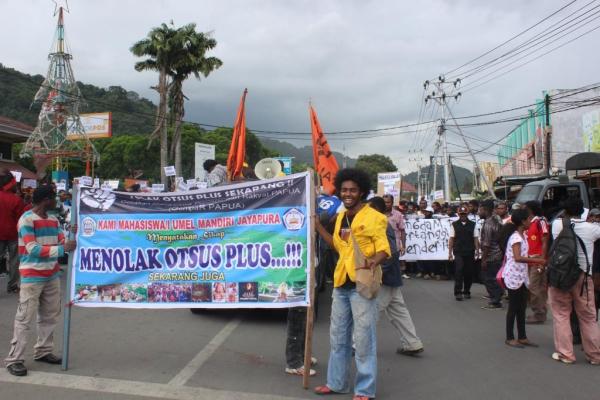Briefing
January 19, 2016
by Yan Christian Warinussy
On Sunday 17th January 2016, I had the opportunity of meeting the United States Ambassador to Indonesia, Robert Blake, during a visit
to Manokwari.
At the meeting which lasted about 45 minutes, Ambassador Blake
asked me about the views of my organisation, the LP3BH. Ambassador
Blake asked me about the general situation in West Papua and recent
developments as well as the human rights situation here in West Papua
and he also wanted to know about the policy of President Joko Widodo
towards Papua and West Papua.
I told the Ambassador that the situation here continues to be
highly unsatisfactory in view of the many cases of human rights
violations, none of which had been dealt with in a court of law.
I referred in particular to the various laws and regulations that
were now in force, such as Law on Human Rights 39/1999 and Law 26/2000 on Human Rights Courts. In addition, I drew his attention to Law 21/2001 on Special Autonomy for the Province of West Papua, as amended by Law 35/2008.
I referred in particular to a number of cases of grave human rights
violations such as the Wasior Case (2001), the Wamena Case (2002), the
Paniai Case (8th December (2014), the Tolikara Case (2015) when eleven
civilians were shot and wounded, whereas none of these cases has been
dealt with in a law court.
Ambassador Blake was very concerned about all these incidents and
the failure up to the present day by the Government of Indonesia to
deal with any these cases.
Ambassador Blake said that his government would guarantee that all
those who had ben responsible for these violations would be excluded
from any its governmental programmes related to education and human rights.
Speaking as a lawyer and a Human Rights Defender, I submitted a
written report to Ambassador Robert Blake, hoping that this would be
handed over to the US Government.
I also told Ambassador Blake that these matters were now being
seriously considered by various governments which were members of the Melanesian Spearhead Group (MSG) and members of the Pacific Islands Forum. I drew his attention to the fact that the United Liberation
Movement for West Papua had been granted observer status by the MSG
in June 2015.
The result of all this was that these various regional state groups
had pressed for a fact-finding human rights mission to be sent to
West Papua and Papua.
I also expressed the opinion that (examination of) all these serious cases should be considered by the Government of the USA as the only way to strengthen democracy and peace throughout the Land of Papua.
With regard to the security situation in the Land of Papua, I stressed that the security forces now based in the Land of Papua should be instructed not to used firearms to handle the situation in the Land of Papua.but to deal with these incidents with peaceful means, instead of using the force of arms.
. I also urged the US Government to exert pressure on the Government
of Indonesia, under President Joko Widodo to respond to the peaceful
moves that had been taken by Papuan NGOs to resolve the social
conflicts in the Land of Papua.
Peace
Yan Christian Warinussy is Executive Director of the LP3BH, the Institute for Research, Investigation and the Development of Legal Aid, and Recipient of the John Humphrey Freedom Award, 2005, Canada.
Translated by Carmel Budiardjo, Recipient of the Right Livelihood Award, 1995.
Edited for clarity by West Papua Media




